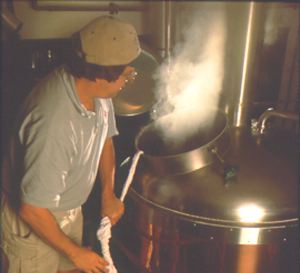Boscos Flaming Stone Beer
We’ve recently been in touch with Chuck Spypeck and Jeremy Feinstone of Boscos Brewery in Memphis, Tennessee, USA, as far as we can tell, the world’s last remaining commercial hot rock brewery. Boscos Juniper “Stone” Beer was a Gold Medal Winner at the 2000 Great American Beer Festival and for all intents and purposes is a fulacht beer! The similarities are remarkable.
Chuck got interested in the stone beer brewing process in the late 1980’s, researched the topic and found some information on breweries using this technique in Germany and Austria up until the early 1900’s. The process had been revived by Rauchenfels in Bavaria in the late 80’s and was being carried out until about two months before Billy and I travelled over, having been bought out and no longer functioning as a stone brewing facility… it seems that we followed the same research avenue 13 years later, reaching the same conclusions as Chuck – that hot stone brewing must have been the primary means of beer production in prehistory.
Chuck began brewing hot stone beer in 1993 and since then it’s been Boscos best selling beer.
Boscos use Colorado Pink Granite to heat their mash. The stones are heated in a brick oven and added to the mash – in a process known as decoction, whereby the temperature is gradually raised over a period of time. Coincidentally, we had a discussion with a brewer at WAC who suggested that we simplify our fulacht process even further by using decoction. The beer we produced for Headfest was brewed using that method.
What really surprised us was that, as simple as our original method was, the decoction method was even easier. Instead of having to heat our water to the optimum temperature prior to adding our malt, we simply dumped our malt into the cold water, didn’t bother with a wicker basket, added the stones over an hour or two, stirring with a paddle occasionally, and then brought it to a final boil. No need for vigorous stirring, no need for physical effort, just the infrequent paddle intervention – and the beer turned out to be just as good. With practice, we reckon we could really improve the palatability of the beer and improve the complexity of the flavour.

Chuck Skypeck of Boscos brews Stone Beer
Boscos process involves a secondary juniper bough filtering process reminiscent of Sahti, as well as using the caramelized sugars on the hot rocks by rinsing them off the stones and back into the beer after fermentation. With Chucks permission we’ll publish more details of their process at a later date. We’re hoping to visit Boscos next year and have a look at their process – after all they can rightly claim to be the only commercial practitioners of the most ancient brewing process in the world, with a heritage possibly reaching as far back as the Irish Bronze Age.
And, we’d love to see what the perfect fulacht pint would taste like!
This entry was posted on Friday, October 17th, 2008 at 12:36 pm. It is filed under About the Beer and tagged with ale, archaeology, consultants, flaming stone beer, galway, hot rock.
You can follow any responses to this entry through the RSS 2.0 feed.



